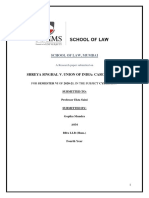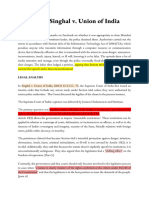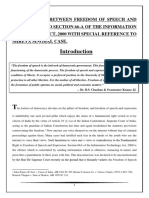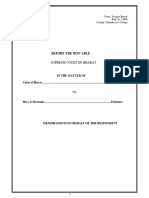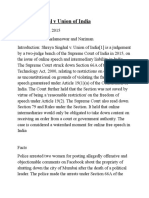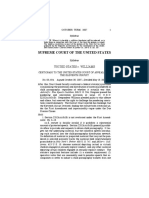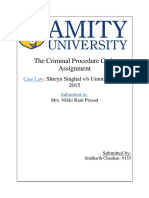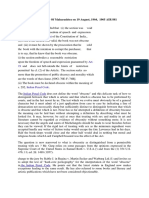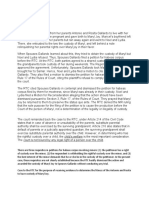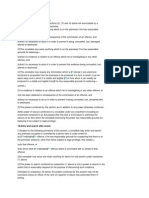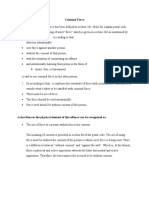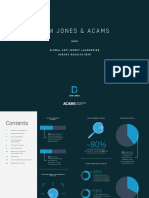May it please this Hon’ble Court,
I appear on behalf of the Petitioners.
We respectfully seek a stay on the enforcement of Sections 79 and 296 of the Hogwarts
Nyaya Sanhita, 2023, and Section 67 of the Information Technology Act, 2000—not to
escape trial, but to prevent the misuse of criminal law to punish constitutionally protected
expression.
Your Lordships, this is not a case of obscenity in the public domain. This is a case where the
criminal justice system has been triggered not by harm, not by disruption, but by offence
taken on social media, without legal basis or procedural fairness.
🔹 I. Prima Facie Case — The Law Is Vague. That Chills Free Speech.
Your Lordships, the terms used in these provisions—"obscene", "prurient interest",
"lascivious", and "modesty"—are undefined in both the Hogwarts Sanhita and the IT Act.
There’s no statutory test. No legal certainty. And that opens the door for arbitrary use.
In Shreya Singhal v. Union of India, (2015) 5 SCC 1, this Hon’ble Court struck down
Section 66A of the IT Act on precisely this ground. The Court held:
Quite apart from this, as has been pointed out above, every expression used is nebulous in
meaning. What may be offensive to one may not be offensive to another. What may cause
annoyance or inconvenience to one may not cause annoyance or inconvenience to another.
Even The expression "persistently is completely imprecise-suppose a message is sent thrice,
can it be said that it was sent "persistently? Does a message have to be sent (say) at least
eight times, before it can be said that such message is "persistently sent? There is no
demarcating line conveyed by any of these expressions--and that is what renders the section
unconstitutionally vague.”
That’s exactly what’s happened here.
In Shreya Singhal v. Union of India, (2015) 5 SCC 1, this Hon’ble Court struck
down Section 66A of the IT Act on precisely this ground.
Petitioner advocate
Section 66-A has a chilling effect on free speech. The terms used in the section, for
example, "grossly offensive", "menacing character", "annoyance", "inconvenience",
"danger", "obstruction", etc., are vague and fail to provide any reasonable standard of
application or adjudication. Additionally, these undefined expressions, do not comport
to any of the permissible grounds mentioned in Article 19(2), under which the
freedom of speech and expression may be legitimately restricted by the State
�The Petitioners uploaded a stand-up episode to a private YouTube channel, with age
restrictions, warnings, and paywall access [Moot Prop ¶6–8].
And yet, FIRs were filed within 24 hours—invoking even Section 296, which criminalises
gestures meant to insult the modesty of a woman.
Due to the vague, undefined terms/phrases employed in Section 66-A, it remains uncertain as
to what act is criminalised under the provision. Criminal law should with certainty indicate
the acts that are permissible to a citizen. When such vague terms are used which permit
arbitrary exercise of power, and further, when such uncanalised power is vested in an
authority, the law would suffer from the vice of discrimination, since it would leave it open to
an authority to discriminate between persons and things similarly situated. [Ref.: Moneka
Gandhi v. Union of India, (1978) 15CC 248, at Para 16
So not only is the law vague, it’s being used where the basic ingredients of the offence don’t
even exist.
Yet, FIRs were lodged against the Petitioners—not against the person who made it public.
This is prosecution by outrage. The law cannot allow criminal charges where there was no
intent, no unlawful exposure, and no clarity on what even qualifies as ‘obscene.’
🔹 II. Irreparable Harm — What’s Been Lost Can’t Be Recovered
The consequences here are not hypothetical.
This is not a “pending trial.” This is trial by reputation, without a charge-sheet, and without
evidence.
And as held in Khushboo v. Kanniammal (2010) 5 SCC 600, this Court warned that:
.” There are numerous other decisions, both from India and foreign countries which mandate
that "obscenity" should be gauged with respect to contemporary community standards that
reflect the sensibilities as well as the tolerance levels of an average reasonable person.
In the present case, the substance of the controversy does not really touch on whether
premarital sex is socially acceptable. Instead, the real issue of concern is the
disproportionate response to the appellant's remarks. If the complainants vehemently
disagreed with the appellant's views, then they should have contested hot views through the
news media or any other public platform. The law should not be used in a manner that has
chilling effects on the "freedom of speech and expression"
Your Lordships, even if the Petitioners are acquitted eventually, they cannot restore what has
already been lost—contracts, public image, creative momentum, and digital presence.
�This is not enforcement. This is erasure.
🔹 III. Balance of Convenience — No Harm to the State, But Daily Loss to the
Petitioners
The State, with respect, has not shown any evidence of harm to public order, decency, or
morality.
Clarification 5 confirms that the episode was behind:
Age-verification,
YouTube’s default adult-content settings, and
Paywall access only for verified adult subscribers.
There was no broadcast, no unsolicited distribution, no outreach to minors.
Contrast this with what the Petitioners have lost—daily visibility, audience trust, employment
opportunities. This is a content creator’s entire livelihood collapsing overnight.
In Dalpat Kumar v. Prahlad Singh (1992) 1 SCC 719, the Court stated:
In other words, the court, on exercise of the power of granting ad interim injunction, is to
preserve the h subject matter of the suit in the status quo for for the time being. It is
settledlaw that the grant of injunction is a discretionary relief. The exercise thereof is subject
to the court satisfying that (1) there is a serious dis-a puted question to be tried in the suit and
that an act, on the facts before the court, there is probability of his being entitled to the relief
asked for by the plaintiff/defendant; (2) the court's interference is necessary to protect the
party from the species of injury. In other words, irreparable injury or damage would ensue
before the legal right would be established at trial; and (3) that the comparative hardship or
mischief or inconvenience which is likely to occur from withholding the injunction will be
greater than that would be likely to arise from
That principle applies directly here. Because if interim protection is not granted, the
Petitioners will be punished by the process alone.
IV. Process as Punishment — FIRs Filed in 24 Hours Based on Social Media, Not
Law
Your Lordships, the real harm in this case began even before a courtroom was entered.
As shown in ¶9–10 of the Moot Proposition, the FIRs against the Petitioners were filed
within 24 hours of a short clip going viral on social media.
There was:
� No investigation into the full episode,
No inquiry into platform settings,
No attempt to verify the context or intent.
Instead, FIRs were registered based entirely on selective outrage triggered by a clip taken
out of context, and circulated without consent.
The Petitioners didn’t release this video publicly.
They uploaded it to a private, age-restricted YouTube channel, with clear warnings and
disclaimers, as stated in ¶6–8 of the Proposition. It was meant only for adults who paid for
access.
But one 20-second moment, lifted without permission and broadcast online, was used to
spark social media outrage. And within hours, they weren’t just being trolled—they were
facing criminal charges.
Your Lordships, the Petitioners were:
Branded guilty before any court had heard them,
Dropped by sponsors,
Cancelled from events, and
Pulled from platforms.
All within days.
They are not being prosecuted after facts are examined—they’re being punished before facts
are tested.
That’s not a fair process. That’s process as punishment.
And this Court’s protection is not just about trial outcomes—it’s about stopping harm that
happens before a verdict is ever passed.
🔹 V. “Public Place” Cannot Mean a Private, Age-Gated Digital Space
Section 72 of the HNS criminalises obscene acts in “public places.”
But the episode in question was:
password-protected,
age-verified,
not searchable or shareable without subscription.
How can a private, filtered platform, accessed only by consenting adults, be treated as
equivalent to a marketplace or cinema hall?
�If we allow Section 72 to apply here, it opens the door for every OTT series, every adult-
rated stand-up set, every private podcast to face criminal trial—if anyone, anywhere, clips 10
seconds and posts it out of context.
That is not proportionality. That is censorship by legal intimidation.
🔹 Conclusion
Your Lordships, the Petitioners have raised a serious constitutional question about vague
laws, private digital expression, and criminal overreach.
They have suffered reputational destruction, financial loss, and social condemnation—
without trial, without evidence, and without any breach of public order.
There is no pressing harm to the State. There is deep, daily harm to the Petitioners.
We respectfully urge this Hon’ble Court to stay enforcement under Sections 72 and 296 of
the Hogwarts Nyaya Sanhita and Section 67 of the IT Act, until the constitutional questions
raised are decided.
Let the Court judge the law—before the public condemns the artist.
Let speech breathe, while justice speaks.
Much obliged.
In light of the submissions made above, the Petitioners most respectfully pray that this
Hon’ble Court may be pleased to:
1. Issue an interim stay on the enforcement of FIRs and any coercive action under
o Section 72 and Section 296 of the Hogwarts Nyaya Sanhita, 2023, and
o Section 67 of the Information Technology Act, 2000,
against the Petitioners, pending final adjudication of the writ petition;
2. Declare that the application of the above provisions to the Petitioners’ age-gated,
paywalled digital content amounts to a violation of
o their fundamental rights under Articles 14, 19(1)(a), and 21 of the
Constitution of India;
3. Quash all FIRs filed against the Petitioners under the impugned provisions in relation
to the stand-up episode referred to in the Moot Proposition;
4. Pass any other order or direction as this Hon’ble Court may deem fit in the interest
of justice, equity, and fairness.
And for this act of kindness, the Petitioners, as in duty bound, shall ever pray.
� 1. Statutory Vagueness Violates Article 19(1)(a)
o The terms “modesty”, “lascivious”, and “prurient interest” are undefined,
subjective, and open-ended.
o They invite arbitrary interpretation, violating the doctrine of void for
vagueness upheld in Shreya Singhal v. Union of India, (2015) 5 SCC 1.
2. Overbreadth and Chilling Effect on Legitimate Expression
o These provisions criminalize a wide range of expressive conduct—comedy,
satire, adult-only artistic content—without requiring demonstrable harm.
o The fear of prosecution deters creators from engaging in constitutionally
protected expression, creating a chilling effect. (Khushboo v. Kanniammal,
(2010) 5 SCC 600)
Balance of Convenience Favours Petitioners
1. Minimal Harm to Respondents from a Stay
o No imminent threat to public order or societal disruption has been shown.
o The content was age-gated and restricted to adult subscribers behind a digital
paywall.
2. Substantial Hardship to Petitioners Without a Stay
o Petitioners are exposed to process-as-punishment—years of litigation for
content that is legally debatable.
o The enforcement of vague provisions during pendency will deter not just
petitioners but the entire creative community from engaging with satire, social
commentary, or bold expression.





